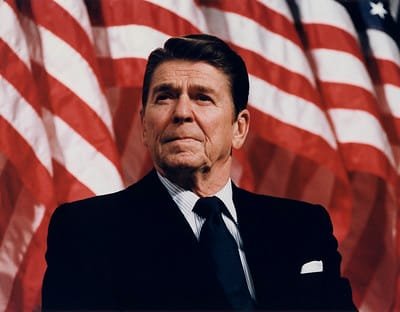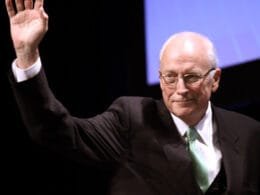Mark Weinberg and His Memoir
Mark Weinberg is a distinguished author and political consultant who gained prominence during his tenure in the Reagan administration. He served as the special assistant to President Ronald Reagan, providing strategic advice and communication support. Weinberg’s deep-rooted connections and experiences with the Reagan family offer a unique perspective that sets the stage for his memoir, “Movie Nights with the Reagans.” This work captures not only the political landscape of the 1980s but also the personal and familial dynamics within the Reagan household.
Having grown up in a politically engaged environment, Weinberg’s fascination with public service was evident early on. His journey culminated in his role within the White House, where he was privileged to witness pivotal events and intimate moments that shaped the Reagan era. Throughout his time in the administration, Weinberg developed a close relationship with the Reagans, which informs the intimate anecdotes shared in his memoir. The unique vantage point from which he recounts these events allows readers to explore the complexities of the political arena intertwined with personal storytelling.
In “Movie Nights with the Reagans,” Weinberg offers an insider’s view of the routines and traditions that characterized family life in the White House, particularly the beloved movie nights. These gatherings served as a convergence of entertainment, relaxation, and candid dialogue amidst the pressures of running a country. Through his engaging narrative, Weinberg captures the essence of the Reagans, revealing both their public personas and private interactions. The memoir is not just an account of political history; it is a personal reflection on the bonds forged in a unique historical setting.
The Context of the Reagan Presidency
Ronald Reagan, the 40th President of the United States, served from 1981 to 1989 during a transformative period characterized by both significant challenges and accomplishments. His presidency unfolded against a backdrop of intense political and social change, defined primarily by the Cold War tensions, economic shifts, and the rise of conservative values. The political climate was marked by a struggle against the Soviet Union, highlighted by Reagan’s vigorous stance against communism, which played a pivotal role in his administration’s foreign policy.
Domestically, the economic landscape was complex, as Reagan implemented his vision of “Reaganomics.” This approach included significant tax cuts, deregulation, and a focus on reducing the size of government. While these policies aimed to stimulate economic growth, they also led to rising deficits and increased income inequality, sparking considerable debate among political analysts and citizens alike. The juxtaposition of economic growth alongside social challenges defined this era, affecting not only national policies but also individual lives, including those within the Reagan family.
During this time, family movie nights became a sanctuary for the Reagans, allowing them to detach from the pressures of political life, even if momentarily. The films selected often mirrored the cultural narratives of the time and served as a lens through which the family’s values, humor, and political ideologies were expressed and reinforced. Personal anecdotes shared in Mark Weinberg’s memoir serve to illustrate how these cinematic experiences provided both a refuge and a means of bonding amidst the turbulent political atmosphere. Consequently, the Reagan presidency was not only marked by its public policies and international relations but also by its personal moments captured in the warmth of their home environment.
The Great American Tradition of Movie Nights
Movie nights have long held a cherished place in American culture, evolving into a beloved family tradition that transcends generations. As families gather together in the cozy confines of their living rooms, they create an intimate space for connection and shared experiences. This ritual serves not only as a form of entertainment but also as an opportunity for family members to engage with one another, fostering bonds that may otherwise remain unexamined amidst the busyness of everyday life.
The act of selecting a film, preparing snacks, and settling in for an evening of cinematic adventure cultivates a warm environment where meaningful conversations can flourish. This communal experience carries with it a sense of nostalgia, as it mimics the communal aspects of storytelling traditions passed down through the ages. The Reagan household exemplified this phenomenon, where movie nights were more than just an escape from reality; they were pivotal moments for shared laughter, discussions, and reflections on life. Such traditions encapsulate the essence of familial bonding, offering a reprieve from the demands of the outside world.
Movie nights are enriched by the rituals that accompany them. From popcorn-making and pillow forts to themed decorations or dress codes based on the film genre selected, these elements enhance the experience and create lasting memories. Each family may have its unique customs, solidifying their respective identities and narratives. As families replay favorite films or introduce new ones, they reinforce familial ties while also allowing each member to express their individual preferences and perspectives, making the experience inclusive and dynamic.
Ultimately, movie nights represent a microcosm of the larger American experience, where diverse backgrounds and experiences converge over the shared love of film. This tradition highlights the importance of togetherness in an increasingly disconnected world, reminding us that even simple activities can lead to profound connections and shared understanding.
Behind the Scenes of Movie Nights with the Reagans
Throughout “Movie Nights with the Reagans,” Mark Weinberg offers readers an intimate glimpse into the informal family gatherings that brought the Reagans together in their home. These movie nights were not merely an escape from political responsibilities but a cherished tradition where family bonds were strengthened over classic films and lighthearted banter. Notable anecdotes illustrated in the memoir highlight the playful dynamics between Ronald and Nancy Reagan, as well as the delightful interactions with their children and close friends.
One of the most memorable film selections included the timeless classic “Casablanca,” which sparked spirited discussions among family members regarding the film’s themes of love and sacrifice. According to Weinberg, these discussions often led to humorous exchanges, revealing not just their film preferences but also the personalities that made up this iconic family. Nancy, known for her keen eye for detail, often shared insights into the wardrobe choices of the characters, while Ronald would tie in historical references, blending fiction with their own experiences in governance and public service.
Anecdotes from these gatherings reveal the lighter side of politics, where Ronald Reagan would occasionally impersonate characters from the films, bringing laughter and joy to the living room. This sense of humor enriched the atmosphere, solidifying the bond among family members as they navigated their high-profile lives. Weinberg’s retelling emphasizes the authenticity of these moments—an opportunity for the family to step away from the public gaze and simply be themselves.
As the memoir reveals, these movie nights were not only about the films; they represented a sanctuary where the Reagans could unwind, engage in meaningful conversations, and embrace the warmth of family togetherness. The combination of film and familial love created lasting memories, showcasing the human side of a family that often found itself in the limelight.
Lessons Learned from the Reagan Family
Mark Weinberg’s memoir, “Movie Nights with the Reagans,” offers profound insights into the values and life lessons he gleaned from his time with the renowned Reagan family. Central to his narrative are the themes of family, loyalty, and the power of storytelling, which resonate throughout his experiences in the Reagan household. These lessons, often imparted through everyday moments, underscore the significance of these ideals in shaping both personal character and community bonds.
Family is at the heart of the Reagan legacy, as Weinberg vividly recounts evenings spent together, discussing Hollywood films and their underlying messages. These gatherings were not merely recreational; they were crucial in reinforcing familial ties and fostering a sense of belonging. The Reagans believed that strong family connections served as a foundation for resilience in the face of public scrutiny and political challenges. This realization stresses the importance of nurturing relationships and prioritizing family time, a lesson invaluable for all individuals striving for balance in their lives.
Loyalty, another key value presented in Weinberg’s reflections, is exemplified through the unwavering support the Reagan family showed one another. This loyalty extended beyond blood relations; it included friends and staff who became part of their extended family. The memoir highlights instances where loyalty translated into action, whether it was through public support or private encouragement. Such moments serve as powerful reminders of the importance of standing by those we care about, reinforcing teamwork and mutual respect within any group.
Lastly, the power of storytelling permeates Weinberg’s narrative. The Reagans understood that stories have the capability to inspire, educate, and connect individuals across generations. Through shared film experiences, they highlighted the significance of narratives in shaping worldviews and bridging gaps in understanding. This lesson encourages readers to harness the power of their own stories, providing a means for self-expression and connection in an increasingly complex world.
Cinematic Influences and the Movies That Defined the Era
The cinematic landscape during the Reagan years was marked by a distinctive blend of optimism, escapism, and political commentary, deeply influencing both popular culture and the personal lives of those who viewed these films. Movie nights with the Reagans were enriched by an array of genres, spanning comedy, drama, and action, all of which mirrored the societal values and issues of the time. One cannot overlook how films such as *Footloose* and *The Breakfast Club* captured the essence of youthful rebellion and the desire for freedom, resonating not only with the general public but particularly with the First Family, whose own experiences illuminated these themes.
In a more serious vein, movies like *The Killing Fields* and *Platoon* confronted the harsh realities of war and political turmoil, inviting reflection on the complex global landscape of the 1980s. These films provided a narrative that often aligned with Reagan’s foreign policy views, intertwining entertainment with ideology. The cinematic conversations during these nights fostered a connection among the family members, allowing them to engage with contemporary issues while enjoying memorable performances from iconic actors like Meryl Streep and Tom Hanks.
Furthermore, memorable quotes from these films often found their way into the Reagan household, creating a shared lexicon that reflected their values and thoughts on governance, society, and personal resilience. The genres explored during these nights not only offered entertainment but also served as a window into the social fabric of America, providing insights into the hopes, fears, and aspirations of a generation. From lighthearted romantic comedies to the tense drama of political thrillers, the array of films played a significant role in shaping a cultural identity that was distinctly American, and uniquely Reagan.
The Impact of the Memoir on Contemporary Readers
Mark Weinberg’s memoir, “Movie Nights with the Reagans,” offers a unique glimpse into the intersection of politics and personal relationships, appealing to contemporary readers who are increasingly interested in the human side of political figures. By blending anecdotes from his experiences with the Reagan family and observations from his time in the White House, Weinberg creates a narrative that resonates with those grappling with the complexities of modern political life. His storytelling effectively captures the nuances of friendships formed in the politically charged atmosphere of the 1980s, thereby fostering a sense of empathy and understanding that transcends time.
In today’s environment, where political polarization is prevalent, the memoir serves as a reminder of the importance of personal connections, even among those with differing ideologies. Weinberg’s reflections on shared moments, such as movie nights with President and Mrs. Reagan, highlight the universal themes of friendship, loyalty, and the pursuit of happiness. Contemporary audiences find solace in his recounting of these intimate gatherings, revealing that relationships, regardless of their political backdrop, are built on shared interests and mutual respect.
The art of storytelling is central to Weinberg’s work, showcasing not only the events that took place but also the emotional context surrounding them. Literary critics have responded positively, commending the memoir for its engaging prose and its ability to capture the reader’s imagination. Reviewers note that the richness of his storytelling invites readers into a hidden world, allowing them to experience the mundane alongside the significant. As a result, Weinberg’s memoir is not merely a biographical account but a reflection on the human experience, prompting readers to consider their perspectives on political life and personal relationships in today’s society.
Reflections on Serving in the Reagan Administration
Mark Weinberg’s tenure as a political aide in the Reagan administration was marked by a dynamic interplay of challenges and triumphs that shaped his views on leadership and governance. The political landscape during this era was characterized by significant changes, both domestically and internationally. Working closely with President Ronald Reagan allowed Weinberg to observe firsthand the intricate decision-making processes that often occurred behind closed doors. This experience provided him with valuable insights into the complexities of political strategies and communication.
One of the most pressing challenges faced by Weinberg and his colleagues was navigating the ever-changing political climate. The administration had to contend with fervent opposition from various factions, as well as the pressures of public opinion. The lessons learned during these tumultuous times underscored the importance of resilience and adaptability. Weinberg often reflects on how Reagan’s unwavering optimism served as a beacon for the team, motivating them to persevere through adversity. This commitment to a positive vision became a hallmark of Reagan’s leadership style and had a profound impact on Weinberg’s own approach to problem-solving.
The interpersonal dynamics within the administration further shaped Weinberg’s experience. Collaborating with diverse personalities, each bringing unique perspectives and approaches to governance, required a keen understanding of group dynamics. Communication was essential, and Weinberg learned to effectively convey ideas while navigating the complexities of differing viewpoints. This experience enriched his appreciation for teamwork and collaboration in achieving common goals.
Ultimately, Weinberg’s time in the Reagan administration equipped him with a nuanced understanding of political life. The experiences he recounts in his memoir offer not only a glimpse into the dynamics of working with an iconic leader but also the broader lessons that resonate with anyone interested in the realm of politics and leadership.
Final Thoughts: A Tribute to Family and Film
Mark Weinberg’s memoir, “Movie Nights with the Reagans,” offers a heartfelt exploration of the enduring bond between family and the movie industry. Through the lens of personal experiences, Weinberg delves into the ways in which film served as a vital connection point for the Reagan family. This memoir emphasizes that the magic of cinema extends beyond the screen, influencing relationships and creating cherished memories that last a lifetime.
Weinberg presents the Reagans as a family deeply woven into the fabric of Hollywood. Their love for film transcended mere entertainment; it was an integral part of their storytelling heritage. The memoir reiterates how movies have the power to convey emotions, build connections, and inspire generations. By recounting his time spent watching and discussing films with President Ronald Reagan and First Lady Nancy Reagan, Weinberg encapsulates the intersection of personal experience and cultural commentary. The shared movie nights reflect a sense of normalcy in an extraordinary world, emphasizing the universal appeal of film.
Weinberg’s intention in documenting these moments is clear: he hopes to remind readers of the importance of family ties and the shared experiences that bring people together. The stories he shares shine a light on the legacy of the Reagans, showcasing how their passion for cinema not only influenced their lives but also resonated with audiences across the country. Today, the Reagans’ love for film remains a bridge that connects past and present, demonstrating how cinematic experiences can forge lasting memories and inspire collective appreciation.
In essence, “Movie Nights with the Reagans” serves as a poignant tribute to the power of family and the cultural significance of film. It reminds us that while the tides of time may change, the values of love, connection, and storytelling endure through both shared moments and the art of cinema.




